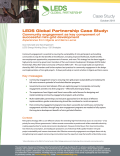
This case study builds on experiences shared by Africa Mini-Grids Community of Practice (AMG-CoP) members and further explores best practices for community engagement in the design and implementation of mini-grid projects. It draws particularly on recent activities in Nigeria and Sierra Leone.

This PDA describes the threats to Mongolia's already-degraded peatlands, and covers management strategies for the restoration and protection of these areas.
This paper presents an ex-ante cost-benefit analysis of large-scale rangeland restoration through the Hima system within the Zarqa River Basin, drawing on experience from a pilot initiative by the International Union for Conservation of Nature (IUCN) and the Jordanian Ministry of Agriculture since 2010. The ecosystem services that arise from rangeland restoration are valued using a combination of stated preference, avoided costs, replacement cost, and market prices approaches.
This case study provides an updated overview of the European electricity sector transition, focusing on key topics like the growth in renewables, conventional power generation, electricity consumption, and CO₂ emissions. The case study also provides an overview of 2018 electricity consumption, generation and emissions by country with downloadable data for emissions by country to enable others to also perform up-to-date analysis.
This case study aims to show peer cities, large and small, that the principles and processes behind fossil fuel divestment are transferable to nearly any location where the will to divest exists.
These case studies demonstrate how corporate buyers have effectively embedded sustainability in their procurement processes to improve resource efficiency and reduce GHG emissions.
This report presents three case studies in the context of centralised large-scale composting facilities in Sri Lanka in order to reveal the factors and approaches that led to positive results under different type of operational modality.
The New Zealand Mineral Monetary and Physical Stock Account, 1994-2000, presents the asset value of minerals in New Zealand. It focuses on minerals that are presently economically utilised in New Zealand, including metallic minerals (gold, silver, and ironsand concentrate) and non-metallic minerals (aggregate, clay, limestone, dolomite, and others).
Chapter 22 of the supplementing technical report, titled Economic Values from Ecosystems, presents an economic assessment of the contribution of ecosystem services on human well-being, following the methodology set out for the UK NEA. Overall, the chapter makes the case that ecosystems and their services are economically very significant at the national scale, underlining the relevance of conservation and efficient management.
This working paper details the results for both the total value of Dutch oil and gas reserves and the government appropriation of the resource rent from extraction. This is part of a larger effort by Eurostat to conduct valuations on sub-soil assets as part of their work to develop environmental accounts linked to national accounts. The methods and data presented in this paper can support both researchers and compilers of accounts for subsoil assets.
